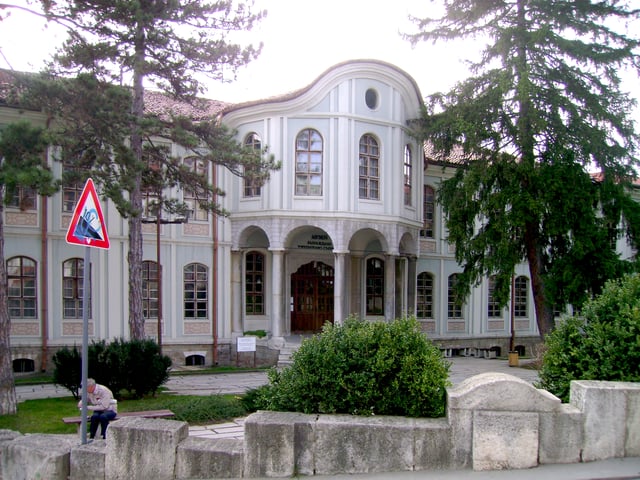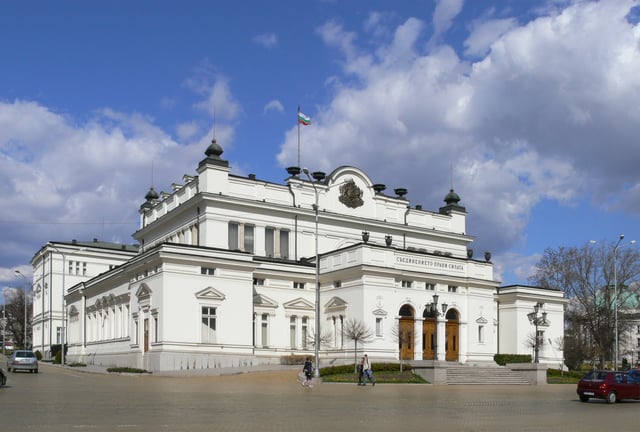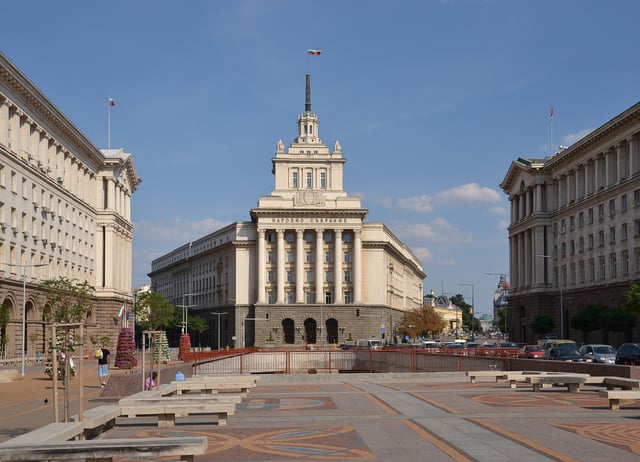National Assembly (Bulgaria)
-3UIHtKgFGtWAh3XmeL8gAc0QLkDva5)
National Assembly (Bulgaria)
-3UIHtKgFGtWAh3XmeL8gAc0QLkDva5)
National Assembly Народно събрание Narodnо sabranie | |
|---|---|
| Type | |
| Type | Unicameral |
| Leadership | |
Speaker | Tsveta Karayancheva, GERB |
Deputy Speakers | Emil Hristov (GERB) Kristiyan Vigenin (BSP for Bulgaria) Nigyar Dzhafer (DPS) Veselin Mareshki (Volya – the Bulgarian patriots) |
| Structure | |
| Seats | 240 |
 | |
Political groups | Government (119)
|
| Elections | |
Last election | 26 March 2017 |
Next election | No later than 26 May 2021 |
| Meeting place | |
 | |
| National Assembly, Sofia | |
| Website | |
| parliament.bg [7] | |
The National Assembly (Bulgarian: Народно събрание, Narodno sabranie) is the unicameral parliament and legislative body of the Republic of Bulgaria.
The National Assembly was established in 1879 with the Tarnovo Constitution.
National Assembly Народно събрание Narodnо sabranie | |
|---|---|
| Type | |
| Type | Unicameral |
| Leadership | |
Speaker | Tsveta Karayancheva, GERB |
Deputy Speakers | Emil Hristov (GERB) Kristiyan Vigenin (BSP for Bulgaria) Nigyar Dzhafer (DPS) Veselin Mareshki (Volya – the Bulgarian patriots) |
| Structure | |
| Seats | 240 |
 | |
Political groups | Government (119)
|
| Elections | |
Last election | 26 March 2017 |
Next election | No later than 26 May 2021 |
| Meeting place | |
 | |
| National Assembly, Sofia | |
| Website | |
| parliament.bg [7] | |
Ordinary National Assembly
The National Assembly consists of 240 members elected for a four-year term elected by proportional representation in multi-seat constituencies. Political parties must garner a minimum of 4% of the national vote in order to enter the Assembly. Bulgaria has a multi-party system.
The Assembly is responsible for enactment of laws, approval of the budget, scheduling of presidential elections, selection and dismissal of the Prime Minister and other ministers, declaration of war, concluding peace and deployment of troops outside Bulgaria, and ratification of international treaties and agreements. It is headed and presided by the Chairperson of the National Assembly of Bulgaria.
The Assembly administers the publication of the State Gazette, Bulgaria's gazette of record.
Procedure
By the Constitution, the National Assembly is inaugurated by the eldest elected member of Parliament. On the first day of sitting, he or she presides over the election of the Speaker (Chairperson) and two deputies.[1]
Once elected, the Speakers retain their party allegiances, which means that they remain as MPs and are allowed to take part in debates and voting.
121 MPs must be present in order for any session to commence, and 50%+1 of those present must vote "for" any point of order or bill to be approved.
Ministers may be chosen from among the MPs or they may be experts outside Parliament. All MPs picked to be Cabinet ministers lose their MP status, and other members from their party are called up to Parliament to fill the seats they vacate.
Parliament sits Wednesday to Friday, and sessions begin at 9 am. Parliamentary committees sit in the afternoons.
Layout
The Chamber is made up of 286 seats, all facing the 5-seat speaker's bench in a 26 x 11 arrangement. In front of the Speaker, also facing the chamber, is the pulpit, in front of which is the stenographers' desk.
Parties sit in parliamentary groups, loosely following the rule that the political left sit to the Speaker's left and the political right to his right. Generally, the largest parties choose the left, right or centre wings of the chamber, with smaller blocks accommodating themselves wherever convenient. Individual MPs will sometimes sit entirely outside their block or stand, and, since compulsory electronic registration was implemented, may even vote from any seat in the house.
To the speaker's right, also facing the chamber, is a section with 17 seats reserved for the Cabinet, any of whom may or may not be present at any time during a parliamentary session. Any of them may, however, be called up by Parliament at any time if needed.[2]
Grand National Assembly

The first National Assembly of Bulgaria in Veliko Tarnovo
In addition to the ordinary National Assembly, a Grand National Assembly (Велико народно събрание, Veliko narodno sybranie) may be convened in order for matters of special jurisdiction, such as: 1) Adoption of a new Constitution; 2) Amendment of certain articles of the Constitution, e.g. those related with the basic civil rights; 3) Changes in the territory (gain or loss) of the Republic, etc. Before the World War II the Grand National Assembly was also competent in electing the Regency of the Bulgarian Kingdom if the tzar had not come to age. The First and the Third Grand National Assemblies also elected the first two Bulgarian monarchs after the liberation from Ottoman rule – Prince (Knjaz) Alexander Battenberg and Prince (Knjaz) Ferdinand Saxe Coburg-Gotha.
As an organ, the Grand National Assembly was introduced with the Tarnovo Constitution of 1879, abolished in 1947 and reintroduced with the 1991 constitution. In different constitutional provisions, it was constituted by a different number of representatives. According to the 1991 Constitution, it consists of 400 deputies (as opposed to 240 in the ordinary one). The 1991 Constitution was adopted by the Seventh Grand National Assembly and was composed of 200 members being elected by proportional representation and the other 200 under a first-past-the-post voting system. The Constitution provides that the elections for Grand National Assembly shall be conducted in the same manner as those for the Ordinary National Assembly.
A qualified majority of 2/3 during three voting procedures on separate dates is required for a decision to be made. The Grand National Assembly can also serve as an ordinary National Assembly, taking care of regular legislative activities, in urgent cases only. After it has concluded its work on the matter for which it was elected, the Grand National Assembly is dissolved ex lege and the President of the Republic shall appoint elections for an ordinary National Assembly.
A total of seven Grand National Assemblies have been in operation in Bulgaria, the last one from 10 July 1990 to 12 July 1991 adopting the current constitution.
Building

Another view from Tsar Osvoboditel.

Office house of the National Assembly (Former House of the BCP)
The National Assembly's main building has been proclaimed a monument of culture for its historic significance. Situated in downtown Sofia, it was designed in Neo-Renaissance style by Konstantin Jovanović.
Due to insufficient space in the main building at Parliament Square, some administrative offices of the National Assembly are now housed by the former headquarters of the Bulgarian Communist Party, located at the Largo. There has been a proposal that the entire National Assembly be permanently moved to the old Party house building, with its inner courtyard being converted into an interior space for the plenary chamber.[3]
List of National Assemblies
| Parliament | Term | Seats |
|---|---|---|
| Constituent National Assembly | 10 February 1879–16 April 1879 | 231 |
| 1 Grand National Assembly | 17 April 1879–26 June 1879 | 231 |
| 1 Ordinary National Assembly | 21 October 1879–24 November 1879 | 158 |
| 2 Ordinary National Assembly | 23 March 1880–18 December 1880 | 172 |
| 2 Grand National Assembly | 7 January 1881 | 307 |
| 3 Ordinary National Assembly | 10 December 1882–25 December 1883 | 47 |
| 4 Ordinary National Assembly | 27 June 1884–6 September 1886 | 195/286 |
| 3 Grand National Assembly | 19 October 1886–3 August 1887 | 493 |
| 5 Ordinary National Assembly | 15 October 1887–17 December 1889 | 285 |
| 6 Ordinary National Assembly | 15 October 1890–15 December 1892 | 276 |
| 4 Grand National Assembly | 3 May 1893–17 May 1893 | 577 |
| 7 Ordinary National Assembly | 15 October 1893–21 December 1893 | 145 |
| 8 Ordinary National Assembly | 15 October 1894–4 February 1896 | 149 |
| 9 Ordinary National Assembly | 1 December 1896–19 December 1898 | 159 |
| 10 Ordinary National Assembly | 16 May 1899–29 November 1900 | 169 |
| 11 Ordinary National Assembly | 22 February 1901–23 December 1901 | 166 |
| 12 Ordinary National Assembly | 22 April 1902–31 March 1903 | 188 |
| 13 Ordinary National Assembly | 2 November 1903–22 December 1907 | 189 |
| 14 Ordinary National Assembly | 15 June 1908–15 February 1911 | 203 |
| 5 Grand National Assembly | 9 June 1911–9 July 1911 | 414 |
| 15 Ordinary National Assembly | 15 October 1911–23 July 1913 | 213 |
| 16 Ordinary National Assembly | 19 December 1913–31 December 1913 | 204 |
| 17 Ordinary National Assembly | 20 March 1914–15 April 1919 | 257 |
| 18 Ordinary National Assembly | 2 October 1919–20 February 1920 | 237 |
| 19 Ordinary National Assembly | 15 April 1920–11 March 1923 | 232 |
| 20 Ordinary National Assembly | 21 May 1923–11 June 1923 | 245 |
| 21 Ordinary National Assembly | 9 December 1923–15 April 1927 | 267 |
| 22 Ordinary National Assembly | 19 June 1927–18 April 1931 | 275 |
| 23 Ordinary National Assembly | 20 August 1931–19 May 1934 | 283 |
| 24 Ordinary National Assembly | 22 May 1938–27 April 1939 | 160 |
| 25 Ordinary National Assembly | 24 February 1940–23 August 1944 | 160 |
| 26 Ordinary National Assembly | 15 December 1945–28 September 1946 | 276 |
| 6 Grand National Assembly | 7 November 1946–21 October 1949 | 465(375) |
| 1 National Assembly | 17 January 1950–2 November 1953 | 239 |
| 2 National Assembly | 14 January 1954–11 December 1957 | 249 |
| 3 National Assembly | 13 January 1958–4 November 1961 | 254 |
| 4 National Assembly | 15 March 1962–8 December 1965 | 321 |
| 5 National Assembly | 11 March 1966–18 May 1971 | 416 |
| 6 National Assembly | 7 July 1971–9 March 1976 | 400 |
| 7 National Assembly | 15 June 1976–7 April 1981 | 400 |
| 8 National Assembly | 16 June 1981–21 March 1986 | 400 |
| 9 National Assembly | 17 June 1986–3 April 1990 | 400 |
| 7 Grand National Assembly | 10 July 1990–2 October 1991 | 400 |
| 36 National Assembly | 4 November 1991–17 October 1994 | 240 |
| 37 National Assembly | 12 January 1995–13 February 1997 | 240 |
| 38 National Assembly | 7 May 1997–19 April 2001 | 240 |
| 39 National Assembly | 5 July 2001–17 June 2005 | 240 |
| 40 National Assembly | 11 July 2005–25 June 2009 | 240 |
| 41 National Assembly | 14 July 2009–13 March 2013 | 240 |
| 42 National Assembly | 21 May 2013–6 August 2014 | 240 |
| 43 National Assembly | 27 October 2014–27 January 2017 | 240 |
| 44 National Assembly | 19 April 2017– present | 240 |
See also
Politics of Bulgaria
List of legislatures by country
